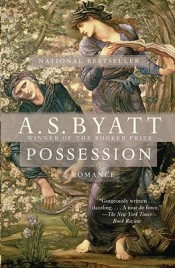 Congrats! If you were reading along or keeping track, this Monday marks the end of the readalong of Possession by A.S. Byatt that Lu (Regular Rumination) and I hosted over the month of March. If you want to get caught up with our thoughts through our first sections of the book, you can find them at these links:
Congrats! If you were reading along or keeping track, this Monday marks the end of the readalong of Possession by A.S. Byatt that Lu (Regular Rumination) and I hosted over the month of March. If you want to get caught up with our thoughts through our first sections of the book, you can find them at these links:
With that housekeeping out of the way, on to some thoughts on the book as a whole!
As I said in one of my earlier posts, the first, I believe, one of the reasons we picked Possession for this project is that it is a book both Lu and I (and it appears many others) have tried to read but abandoned after a few chapters. In fact, when I picked up my book to start this time around I still had the bookmark in it from where I abandoned it around page 50 sometime last year.
Possession isn’t an easy book to get into right away. Our opening narrator, a milquetoast scholar named Roland Mitchell, is hard to care about. And the Victorian poet he studies, Randolph Henry Ash, initially appears equally difficult to care about (especially if you are a reader like me that doesn’t especially love Victorian poetry) despite Roland’s discovery of the drafts of some letters to a mysterious woman — soon revealed as fellow Victorian poet Christabel Lamott — in one of Randolph’s books.
I want to say that the novel picks up, but I don’t think that would be entirely true. The plot gains momentum as Roland and Lamott expert Maud Bailey work to uncover clues about a possible relationship between the two authors, consulting letters, poetry, diaries and other scholarly texts in the process. But the book never really becomes plot-driven in a way I was expecting it too. It’s a restrained but incredibly intelligent novel.
I mentioned in another post, I think the third, that what I realized as I read is that Possession is a novel that rewards work. It rewards readers who are willing to read slowly and deliberately, to appreciate the way Byatt constructs the narrative, the way she doles out clues and red herrings in the different textual pieces she invents to fill in this story. I haven’t read difficult fiction in awhile, so adjusting to that took me some time.
Ultimately though, I’m so glad I read this book. Aside from reminding me about the pleasure there is in slow, challenging reading, Byatt created some deeply engaging characters. The love story/mystery that Byatt creates for Randolph and Christabel and the way their relationship spirals out of control to affect the people around them is moving and sad and wonderful.
The book certainly has some flaws. I never connected with Roland and Maud as much as I wanted to, and some of the peripheral characters in the modern sections of the book were more caricatures than people. And I’ll admit that, more than once, I skimmed over the included poetry because it would just derail me. But I think those are small pieces in comparison to what was, overall, an enjoyable reading experience. Possession is worth the effort and I’m glad I found a way with Lu and the rest of the participants on our #readbyatt hashtag to make that effort worth it.
We’re also working on putting together a watch-along of the movie, which is currently available on Netflix instant. I think we’re still debating between two dates, April 7 or April 14 at 7 p.m. CST. I’ll keep you posted on our decision, or check in with the #readbyatt hashtag on Twitter.





